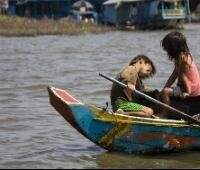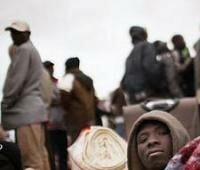Space: the final frontier of Sino-US rivalry?
Issue:Global militarisation
China’s sky-high space ambitions have the potential to upset the current world order. Within the coming decade, China may become capable of challenging America’s dominance over space and its monopoly over global navigational systems.
Over the past few years, China has engaged in completing high-profile, grand projects like high-speed rail, the world’s biggest airport terminal (since overtaken by Dubai) and the 2008 Beijing Olympics. Its space programme, like all else, is a matter of Chinese prestige. On successful completion, it will be yet another grand feather in China’s cap signalling its ambition of becoming a world power.
Image source: Matthew Simantov
Article source: openDemocracy
Read more »Posted on 23/06/11
Finding the Right Paddle: Navigating Climate Change Adaptation and Mitigation Strategies
Issue:Climate change
After decades on the periphery, climate change has made its way onto the national security stage. Yet, while the worlds of science, policy, and defense are awakening to the threats of rising sea levels, stronger storms, and record temperatures, debate continues over the means and extent of adaptation and mitigation programs. In a world of possibilities, how to decide which paddle to use to navigate uncertain waters?
A report from E3G titled, Degrees of Risk: Defining a Risk Management Framework for Climate Security, contends that a more rigorous risk management approach is needed to deal with the security implications of climate change, and cues should be taken from the risk management approach of the national security community. Risk management, while not a “panacea” for divisive climate change politics, “provides a way to frame these debates around a careful consideration of all the available information.”
The report calls for a three-tier, “ABC” framework for international planning:
1) Aim to stay below 2°C (3.6°F) of warming
2) Build and budget assuming 3-4°C (5.4-7.2°F) of warming
3) Contingency plan for 5-7°C (9-12.6°F) of warming
Article source: The New Security Beat
Image source: Pondspider
Read more »Posted on 15/06/11
The economies of violence
Issue:Marginalisation
Are countries poor because they are violent or violent because they are poor?
Yesterday it was Afghanistan and Congo. Today it is Côte d’Ivoire and Libya. Violence, it seems, is always with us, like poverty. And that might seem all there is to be said: violence is bad, it is worse in poor countries and it makes them poorer.
But this year’s World Development Report, the flagship publication of the World Bank, suggests there is a lot more to say. Violence, the authors argue, is not just one cause of poverty among many: it is becoming the primary cause. Countries that are prey to violence are often trapped in it. Those that are not are escaping poverty. This has profound implications both for poor countries trying to pull themselves together and for rich ones trying to help.
Article source: The Economist
Image source: B.R.Q.
Read more »Posted on 14/06/11
Paul Rogers on Development, Climate Change, Conflict and Migration
Issues:Climate change, Competition over resources, Marginalisation
Paul Rogers, Professor of Peace Studies at Bradford University, and Oxford Research Group's Global Security Consultant, talks to Action Aid about the issues that will dominate international security and world development over the coming decades.
Source: youtube
Read more »Posted on 14/06/11
Climate Change, Nuclear Risks and Nuclear Disarmament: From Security Threats to Sustainable Peace
Issues:Climate change, Global militarisation
This study brings to light the multidimensional interplay between climate change, nuclear risks and nuclear disarmament, and its critical implications for the strategic security environment. In addition, it explores prospects and openings to tackle these key challenges, stressing the role played by institutions to “strengthen common ecological and human security, build and reinforce conflict-resolution mechanisms and low-carbon energy alternatives, and create sustainable lifecycles that respect the capabilities of the living world."
Read the full report here.
Image source: GreenDominee
Read more »
Posted on 8/06/11
How Climate Change Can Amplify Social, Economic, and Political Stresses
Issue:Climate change
International Alert's Janani Vivekananda discusses how climate change will will interact with other social, economic and political stressors to drive instability.
"Rather than climate change being this single, direct causal factor which will spark conflict at the national level," Vivekananda said, these stressors "will shift the tipping point at which conflict might ignite." In places that are already weakened by instability and conflict, climate change will simply be an additional challenge.
Source: youtube
Read more »Posted on 8/06/11







.jpg)